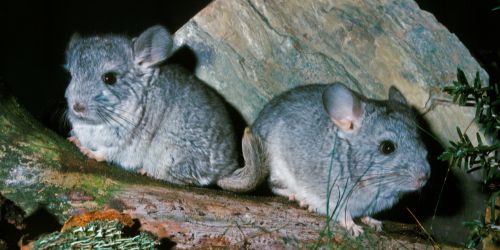Some of the links on our website are affiliate. By making a purchace via our links, you help us create new content and support animal shelters and funds
chinchilla lifespan: how long do chinchillas live?
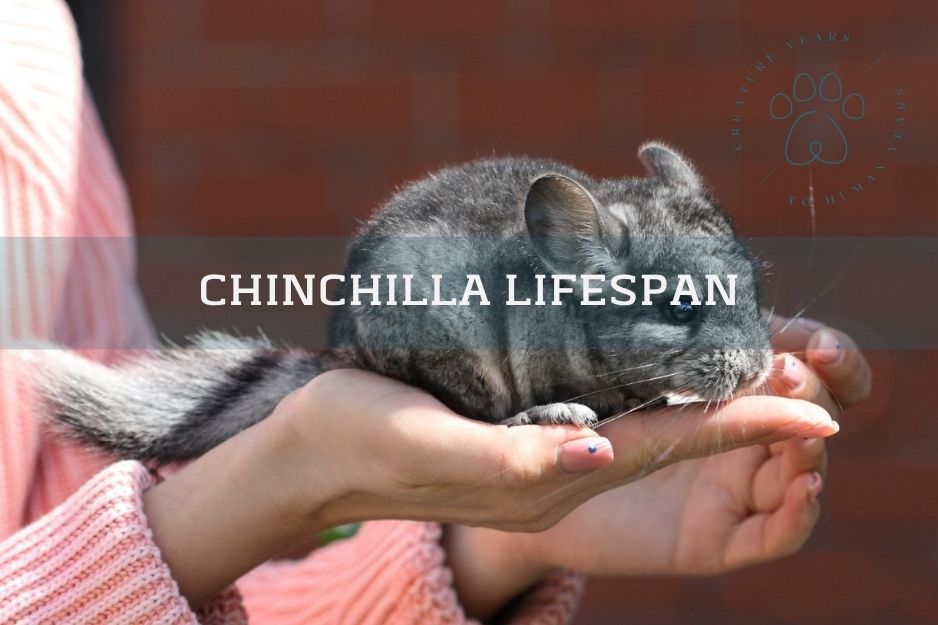
Photo by Tanya Kusova
Chinchillas boast quite a long lifespan compared to their rodent counterparts, making them an attractive choice for household pets. And guess what? Taking care of them is easy too.
If you're considering bringing a chinchilla into your home, you're in for some valuable insights. This article is your guide to all things chinchilla lifespan – we'll unravel the mystery behind their longevity, and explore the key factors that play a role.
So, if chinchilla companionship is on your radar, let's dive in and find out all about chins' lifespan and other things that matter.
How long do chinchillas live?
A pet chinchilla's lifespan is 10 to 20 years. Meanwhile, in their natural habitats, they have an average life expectancy of 9 years.
Some domesticated chinchillas have lived 20 years or longer. Take Radar, for example: the oldest chinchilla who lived to the age of 29 and 229 days (and that's somewhere between 270-300 years if you convert this chinchilla age to human years).
There is no evidence to suggest that female chinchillas live longer than males, or vice versa. So, if you're uncertain about which gender to choose, rest assured that a chinchilla's gender has no proven impact on its life expectancy.
Primarily, chinchilla's lifespan in captivity depends on its diet, environment and overall care. Also, chinchillas often fall victim to accident-related deaths, such as overheating.
Let's take a closer look at these factors and then we'll tell you more about how to prolong chin's life.
Related articles:
- Want to learn even more about chinchillas? Read our article on chinchilla life cycle
What affects chinchilla's life expectancy'?
Chinchillas may live up to two decades in captivity. However, the following factors may shorten the life expectancy of your chinchilla:
1. Nutrition
Giving a chinchilla a healthy diet is essential for ensuring a long life. Chinchillas eat a mixture of fresh produce, high-fiber hay, and commercial pellets. Fresh hay should comprise about 75% to 80% of your chinchilla’s diet. A lack of proper nutrition can lead to various health issues, including fatal constipation and gut infections.
2. Stress
Stressful environments, a lack of food, and health problems may add unnecessary stress to the life of a chinchilla. As with humans, chinchillas may suffer from a variety of physical problems due to excess stress. Potential issues include heart attacks and inadequate sleep.
3. Overgrown teeth
Without an adequate food supply, chinchillas cannot keep their teeth down to a manageable size. Their overgrown teeth may cause a malocclusion, which occurs when the teeth no longer form a proper bite. Malocclusion can lead to injuries, infections, and difficulty eating.
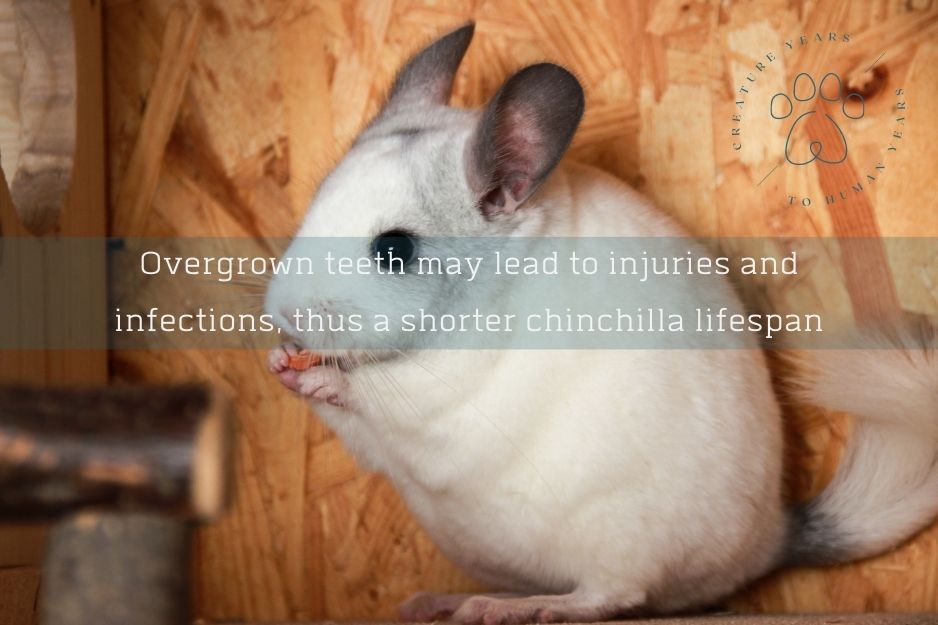
4. Overheating
Chinchillas have dense fur to protect against the cold. When placed in an extremely warm environment, the risk of heart attacks and strokes increases.
5. Choking
Chinchillas are at a higher risk of choking on objects and solid foods compared to many other pets. Unlike dogs and cats, chinchillas and other rodents cannot easily regurgitate.
6. Predators
Chinchillas are small rodents and are considered prey by a wide range of larger animals, which is why they do not live as long in the wild. Captive chinchillas should be protected from dogs, cats, and any animals that may see a rodent as potential food.
7. The runt of the litter
Runts do not always receive adequate nutrition before weaning, which can limit their development and shorten their lifespans.
How to extend your chinchilla’s lifespan?
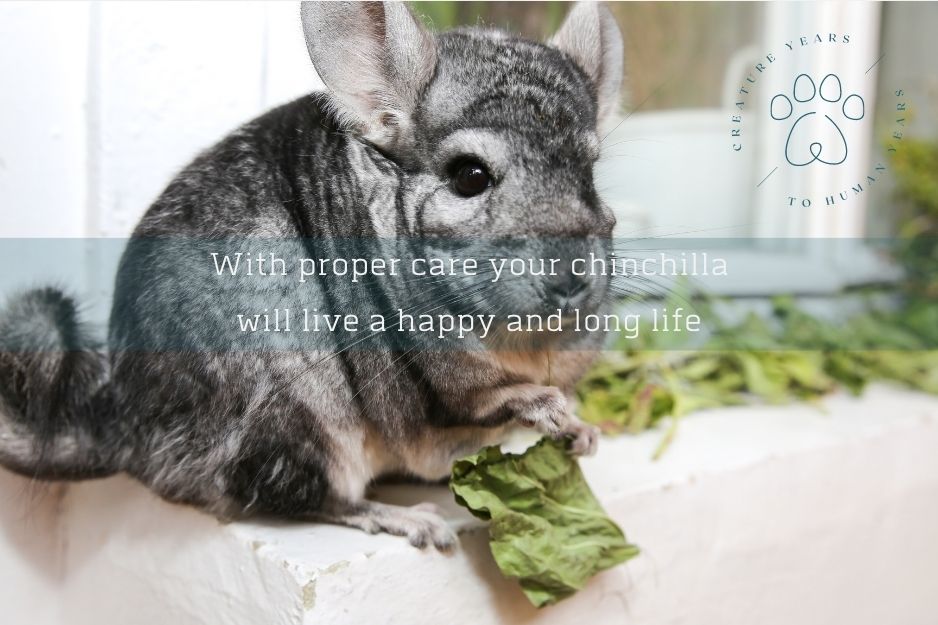
The average lifespan of a chinchilla covers a wide age range, from 10 to 20 years. If you want your chinchilla to live as long as possible, use the following tips to give them the best possible care:
1. Always provide access to something to chew
Chinchillas need to frequently chew to keep their teeth from growing too long, which can lead to health complications. Common choices include a bundle of Timothy’s hay and a block of wood.
2. Give your chinchilla plenty of fiber
Fiber is an important nutrient for chinchillas.
3. Pay attention to your chinchilla’s behavior
Spending time with your chinchilla makes it easier to detect abnormal behavior that may indicate a health issue.
4. Find a veterinarian with experience caring for chinchillas
You can ensure quality veterinary care by choosing a vet who has worked with chinchillas and understands their unique needs.
5. Seek immediate treatment for infections and wounds
Physical trauma is one of the most common causes of death for chinchillas. Sitting on a chinchilla, handling it improperly, or attacks from other animals may cause serious injuries. Without treatment, injuries can lead to potentially fatal infections.
6. Place your chinchilla in an air-conditioned room
Keeping your chinchilla in a room with an average temperature of 60-degrees to 70-degrees may help it live longer. They struggle to cool down in hot environments due to their dense fur coat.
7. Consider getting at least two chinchillas
Chinchillas are social creatures, congregating in groups of 100 or more in the wild. While you may not have room for 100 chinchillas, you may consider housing at least two. A pair of chinchillas can keep each other company, decreasing the risk of loneliness.
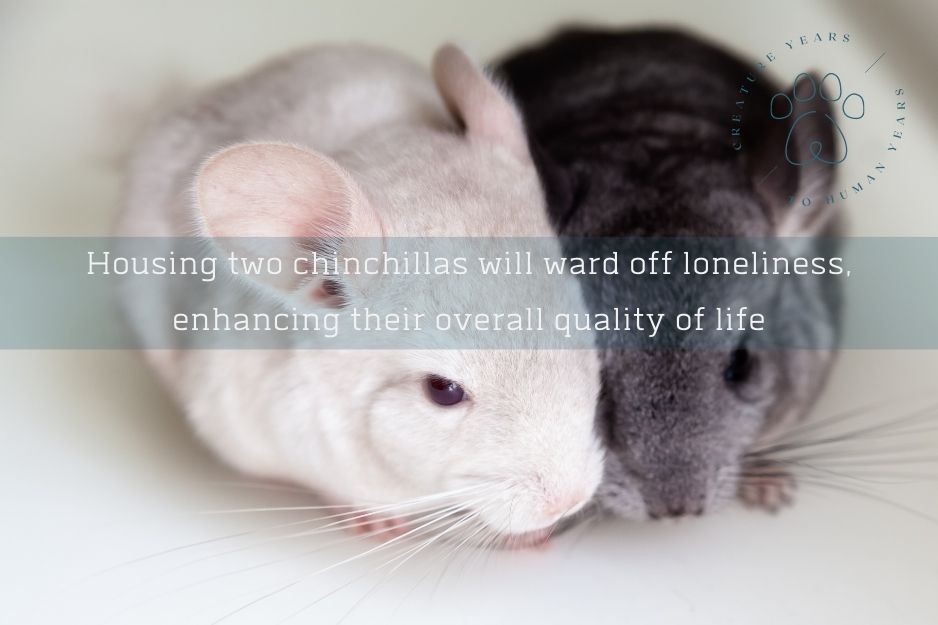
8. Give older chinchillas extra nutrition
Older chinchillas may grow thinner. You can help your chinchilla maintain a healthy weight by adding extra food to their diets, such as additional fresh produce or even pureed baby food.
FAQ
how long do chinchillas live?
In their natural habitats, chinchillas live up to 9 years on average. Whereas domesticated chinchillas can live up to 20 years when properly cared for.
what is female chinchilla's lifespan?
Female chinchilla lifespan is 10 to 20 years. There is no evidence that female chinchillas have a longer (or shorter) lifespan than males.
what is the average lifespan of a pet chinchilla?
The average lifespan of a domesticated chinchilla is 15 years. Some pet chinchillas have lived for 20 years, and the oldest one - for over 29 years.
